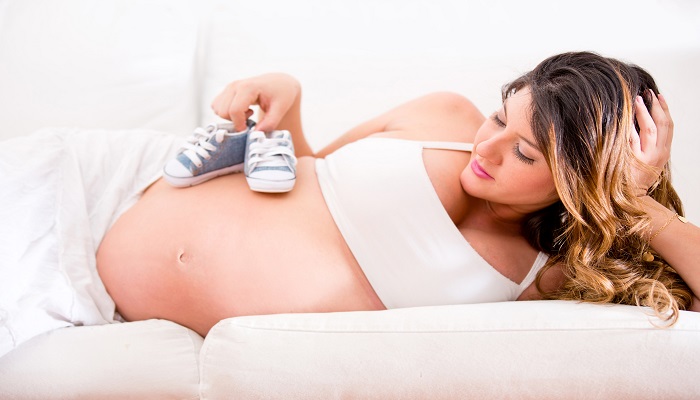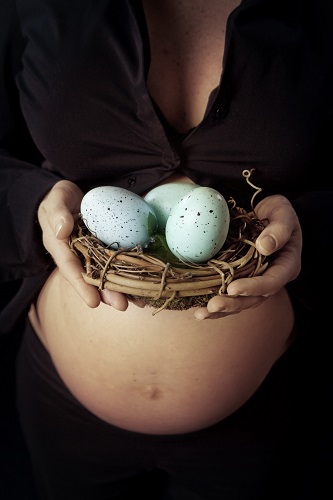If you’re over 40 and anxiously wondering if it’s still possible to get pregnant, deliver and cuddle your own healthy baby, there’s great news for you – yes, you can conceive and have your own adorable bundle of joy after your 40th birthday. However, you should be aware of how age affects fertility and know your available options before exploring pregnancy possibilities over 40.
Pregnancy Near or After Menopause
Menopause is an inevitable phase of a woman’s life and known as the end of her childbearing years. As more women wish to experience pregnancy after 40, the advances made in assisted reproductive technology (ART) offer hope.
There are three phases of menopause: Premenopause, perimenopause and postmenopause. Premenopause is considered any time before menopause, usually when a woman is at her most fertile; perimenopause is when menopause begins and includes a reduction in menstrual cycles; and postmenopause is after menopause ends, or when a woman goes over a year without menstruating. If you’re over 40, chances are you’re experiencing perimenopause or postmenopause, which often hinders pregnancy.
While menopause is a concern if you’re over 40, you can still become pregnant using Donor Egg In Vitro Fertilization (DE IVF).
When choosing donor eggs, you have two options: fresh or frozen. Regardless of your choice, you must carefully select your preferred donor. For some couples, the entire process comes with anxiety, fear, confusion and many questions – all are normal and understandable.
Dealing with the Emotions
A prospective donor egg IVF mother will need to come to terms with not being genetically connected to her future baby. It may help to remember her baby’s life is developed and sustained by the physical connection she shares through the umbilical cord as she carries the pregnancy.
Nothing is quite like that special physical oneness between mother and child established in pregnancy. It’s incredibly vital to bonding. Furthermore, bonding is more physical and psychological than genetic – a healthy mother-child bond is as meaningful as any genetic tie.
Choosing the Egg Donor
Selecting the egg donor is an important part of the egg donation process. When using fresh donor eggs, a donor can be from within a couple’s family or social network as long as she passes the requisite screenings.
Alternatively, if you decide to use an agency, clinic or egg bank, the options are open to choosing between fresh and frozen eggs.
Clinics, agencies and egg banks rigorously screen potential donors before their eggs are retrieved. Screening includes information on the potential donor’s family history, medical history, physical traits, personality traits, achievements, fertility and so on – all of which you’ll review before selecting a donor.
The process may be difficult, but you aren’t alone – competent staff and counselors are available to guide you through the experience.
Whether personally hand-picked or provided by an agency, clinic or egg bank, all donors are required to meet set clinical standards and FDA requirements.
Fresh Donor Eggs vs. Frozen Donor Eggs
To help you choose between fresh and frozen donor eggs, you must know what’s best for your particular situation based on the information below:
Fresh Donor Eggs Pros
- Potential to retrieve a greater number of eggs per cycle and produce more embryos, which can be stored for future IVF cycles to add siblings.
Fresh Donor Eggs Cons
- Possibility for inconsistency retrieving eggs from the donor due to any number of unforeseen factors.
- Donor’s menstrual cycle must synchronize with the recipient’s, which may take longer.
- More legal paperwork hassle.
- More expensive for recipient since they will be paying for the donor’s screening, medications and travel expenses.
- Limited financial options for getting your money back if pregnancy isn’t achieved.
Frozen Donor Eggs Pros
- Consistently supplied in lots of 5 – 8 eggs.
- No need to match donor’s menstrual cycle with recipient’s, expedites process.
- Legal paperwork done in advance.
- Increased privacy (no one knows except those you choose to tell).
- Some companies like Donor Egg Bank USA protect their clients with a money-back guarantee plan to ensure pregnancy is achieved.
- Recipients don’t need to pay for donor’s screenings, medications and travel expenses.
- Has nearly the same success rate as fresh counterparts when handled by experienced experts.
- Less expensive for recipient since all of the eggs have already been screened and retrieved by time of purchase.
Frozen Donor Eggs Cons
- Provided in smaller quantities than fresh (but enough for pregnancy).
- Might not produce as many embryos for future IVF cycles to add siblings.
Making the Best Choice for Your Family
Are you eager to get pregnant and have your baby, running on a tight budget, prefer privacy during your IVF experience and want it as hassle-free as possible? If so, frozen donor eggs may be your best choice, when compared to the time consuming and expensive requirements of a fresh donor egg cycle.
Regardless of the path you take, it is important to do what you think is best for your family. Pregnancy after 40 is possible. Through Donor Egg IVF, you can take the baby you always wanted home.
Do you have a fertility story you would like to share? We understand how sensitive a subject this can be, but if you would like to tell us about it in the comments, we would love to hear it.
FT&PD
Suz
About the Author of this post:
Heidi Hayes is the Executive Vice President of Donor Egg Bank, a California Cryobank Company. She has more than 20 years of healthcare experience and has worked extensively in the field of reproductive endocrinology. Having been unsuccessful at traditional IUI and IVF treatments, Heidi personally understands the struggles of infertility. After many years of trying to conceive, she ultimately built her family through adoption and donor egg treatment. She always believed that if she didn’t give up, her ultimate goal of becoming a parent would someday become a reality.
**Disclosure: This post is sponsored by Donor Egg Bank USA. I have been compensated for this post but always my opinion is my own.




I just did an IVF transfer 2 days ago!!!!! – I`m a surrogate for a wonderful couple trying to have a baby. Fingers crossed!!!!
I can’t imagine being pregnant over 40, but then that is just me, there is a lot of women out there that will have kids till they no longer can! I get wore out just with the grandkids
I am pregnant with my third. my husband and I chose to do this now at 33 and 34 and not wait till later but that is just us!! to each is own and I know a lot of people wait before having kids or change their mind and decide later on in life they do want a child or that they want more. quite common these days
Thanks for sharing this information,pregnancy is far behind me !!
Most women can conceive on their own until age 44. At least that’s what the age cutoff was when I was of child-bearing age. Thanks for posting!
I was a tad disappointed with the title of this article. I thought it was going to encourage women over forty to try to have their own baby ‘the “original way”.. I remember the great fear “‘they’ tried to instill in women of age 35 when I was trying to get pregnant., and yes that was quite a few years ago. I met a young female lawyer who happened to mention that her mother gave birth to her older brother, her mother’s first child, when she was 42 years old and then had two more children after that! That is an encouraging story for a woman who wants to get pregnant after age 40!
I know technology has improved and the medical field is expanding by the day. I don’t have any experience in this but I do notice the news of this topic some times.
I was pregnant with twins at 39 and have to admit that I had a very challenging pregnancy. But, I conceived naturally and did not feel too old to be procreating. My sister-in-law, on the the hand, tried IVF 3 times after 40 and was unsuccessful. All I can say is that it is never too late to try to conceive although it does get harder and harder the years past 40 that you are. Maybe freezing your eggs in your thirties would be a good idea.
I’ve been thinking about becoming a surrogate. So many couples can’t have kids, but have so much Love to give.
My baby years are over now!